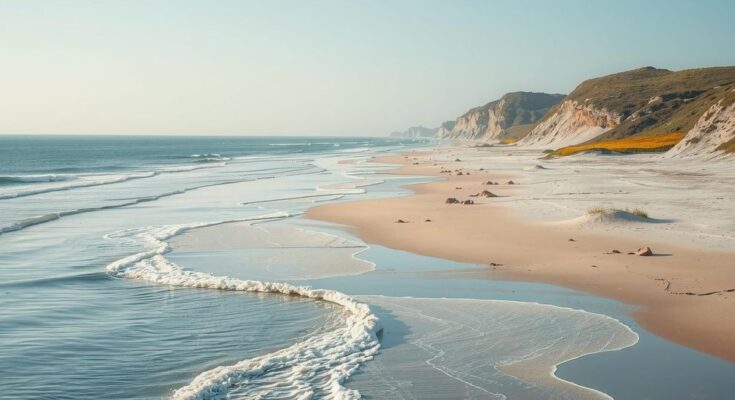Guinea-Bissau is experiencing severe impacts from rising sea levels, with coastal villages such as Djobel facing extinction. Seawater contamination of farmland and drinking water drives residents into deep poverty. Despite minimal greenhouse gas emissions from this region, the communities are disproportionately affected by climate change, emphasizing the urgent need for global climate justice efforts.
The rising sea levels in Guinea-Bissau are increasingly threatening coastal communities, particularly in areas such as Djobel, driving residents into dire poverty. Sea encroachment is contaminating farmland and drinking water, leading to severe economic challenges for villagers. Despite contributing minimally to global greenhouse gas emissions, Guinea-Bissau’s population experiences the brunt of the climate crisis, emphasizing the urgency for global climate justice. Aghoti Sanhan, a 70-year-old villager, lamented, “One day, I will have to make a decision to abandon this house too.”
Reports indicate that since the early 2000s, the effects of climate change, including rising sea levels, intense storms, and extensive rainfall, have become pronounced. Guinea-Bissau, covering approximately 36,000 square kilometers and home to around 2.1 million people, faces significant economic challenges, with 70% of its residents living on less than $1.90 a day. Access to fresh water has become increasingly problematic; once sustainable water sources are now tainted by seawater intrusion.
Villagers, primarily engaged in fishing and rice farming, are struggling as their fields are submerged and rendered non-arable due to salinity. In many instances, homes have been abandoned, showcasing the loss that communities face. Baciro Nango, the village chief, revealed the stark reality, stating, “There is no hope for us.” The Intergovernmental Panel on Climate Change (IPCC) documents a rise in global sea levels, estimating a 20-centimeter increase since 1900, with projections indicating that climate change could lead to rises of up to 1.5 meters by century’s end.
Rising seas, driven by warming temperatures and melting ice caps, are a growing threat. Even with substantial efforts to mitigate emissions, models suggest a continued rise well into the future, significantly impacting populations living in low-lying coastal areas. Former WMO Director-General Petteri Taalas asserted that the battle against sea level rise is far from over, highlighting the urgency for action.
One small hope for Djobel lies in a proposed relocation inland, backed by the UN and the Guinea-Bissau government. Unfortunately, the plan faced fierce opposition from neighboring communities, resulting in conflict and hindering resettlement efforts. Joao Tchedna, a director at the National Environment Institute, emphasized the lack of technology and financial resources available to combat the climate crisis.
Guinea-Bissau’s annual greenhouse gas emissions are negligible compared to global totals, making the plight of the Djobel villagers particularly unjust. The villagers are among the first to feel the impacts of climate change, underscoring the necessity of achieving climate justice at an international level.
Rising sea levels due to climate change significantly affect coastal regions worldwide, with particularly harsh impacts on low-lying countries like Guinea-Bissau. The nation is experiencing increased flooding, degradation of farmland, and a deteriorating freshwater supply, leading to heightened poverty. As a country that contributes minimally to global greenhouse gas emissions, Guinea-Bissau stands as a stark example of climate injustice as its vulnerable communities bear the brunt of a crisis driven largely by industrialized nations. The struggle for equitable climate action is imperative for vulnerable populations, which emphasizes the need for international cooperation and support.
In summary, Guinea-Bissau faces a pressing crisis due to rising sea levels, with coastal communities like Djobel on the brink of extinction. The impacts include widespread poverty, loss of arable land, and deteriorating access to clean water. Despite contributing little to global emissions, the people of Guinea-Bissau are disproportionately affected, highlighting the need for climate justice and enhanced global support. Future resettlement efforts face significant challenges, further complicating an already dire situation.
Original Source: www.weforum.org




